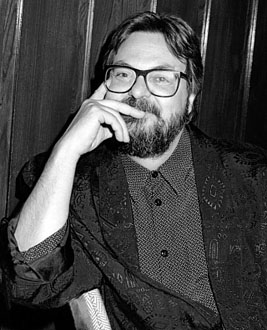
Michel Tremblay
In 1959, Michel Tremblay entered the Institut des arts graphiques and wrote his first play, Le Train. He worked as a linotype operator from 1963–66. In 1964 Le Train won first prize in the Concours des jeunes auteurs sponsored by Radio-Canada; it was broadcast on 7 June 1964. This was the beginning of a long career devoted primarily to theatrical works. The novelist side of Michel Tremblay first appeared with his Contes pour buveurs attardés (1966).
Le Train was produced again at the Théâtre de la Place Ville-Marie between 1965 and 1968. The Mouvement contemporain presented excerpts from Contes pour buveurs attardés and the Patriote mounted Cinq (original version of En pièces détachées) in December 1966. In 1968, Tremblay went to Mexico on a Canada Council grant and wrote La Cité dans l'oeuf, a fantasy novel, and La Duchesse de Langeais, a one-character play about the loves and disillusionments of an old transvestite. After a public reading of Les Belles-Sœurs on 4 March 1968 by the Centre d'essai des auteurs dramatiques, the play was produced on 28 August 1968 by André Brassard, who has continued to stage virtually all productions and revivals of Tremblay's work.
Antirealistic Devices
Les Belles-Sœurs, written in the street language joual, offered a transformed vision of the working-class neighbourhood where the author was born. In 1987 his Le Vrai Monde, his 19th play in as many years, premiered and was hailed as his greatest work. In 1990 the performance of his opera, Nelligan (written in collaboration with musician André Gagnon), added significantly to his reputation. Critics have included him in the theatre of realism, but his frequent use of antirealistic devices (chorus, flashback) and of fringe characters shows he is not following predecessors Gratien Gélinas, Marcel Dubé, Françoise Loranger and Jacques Languirand.
Michel Tremblay has also written musical comedies, has translated and adapted many American and other authors, and is a scriptwriter and songwriter. His many outstanding plays include: À toi pour toujours, ta Marie-Lou (1971), winner of the Chalmers award; Damnée Manon, Sacrée Sandra (1977); Albertine en cinq temps (1984), considered by many to be his best play; La Maison suspendue (1990); Messe solonnelle pour une pleine lune d'été (1996); Encore un peu si vous le permettez (1998) and L'état des lieux (1998). His plays have been translated into many languages, and Les Belles-Sœurs has been especially popular in its Scots-English version, The Guid Sisters (1991); in the Yiddish version, Di Shvegerius (1992); and in Italian.

Concentration on Fiction
Since the mid-1980s, Michel Tremblay has concentrated mainly on fiction. The first three novels of his Plateau Mont-Royal series explored the same world as his plays. Two volumes of largely autobiographical stories, Les Vues animées and Douze coups de théâtre, appeared in 1990 and 1992. Next came Le coeur éclaté (1993), the narrative Un ange cornu avec des ailes en tôle (1995), Quarante quatre minutes quarante quatre secondes (1997), Un objet de beauté (1997), Hôtel Bristol (1999) and L'homme qui entendait siffler une bouilloire (2001), based on Tremblay's own experiences with tinnitus. He has since completed Bonbons assortis (2002), Le cahier noir (2003), Le cahier rouge (2004), Le trou dans le mur (2006) and most recently La traversée du continent (2007), a tribute to his mother and her lone voyage at the young age of 11 by train from Saskatchewan to Québec. He has also written and contributed to the screenplays of numerous films including Françoise Durocher, Waitress (1972), Il était une fois dans l'Est (1973), Parlez-nous d'amour (1976), Le soleil se lève en retard (1977) and C'ta ton tour Laura Cadieux (1998).
Honours and Awards
Michel Tremblay has won many prizes and distinctions, including the prix Victor-Morin in 1974, the Lieutenant-Governor's award for Ontario in 1976 and 1977. In 1991, he was appointed Officier de l'Ordre de France and, in the same year, Chevalier de l' Ordre National du Québec. In 1999, Michel Tremblay receives the Governor General's Award.
In 2015, he was promoted to the rank of Grand officier de l'Ordre National du Québec. The following year, he is made Commander of the Ordre de Montréal.

 Share on Facebook
Share on Facebook Share on X
Share on X Share by Email
Share by Email Share on Google Classroom
Share on Google Classroom



